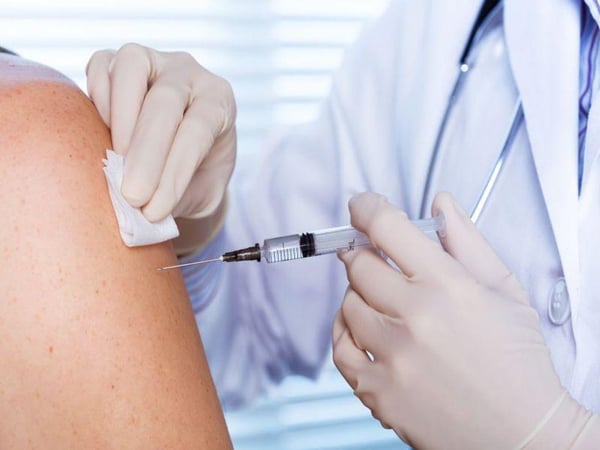Allergic Reaction to Your First COVID Shot? Risk of Another Is Low, Study Finds

TUESDAY, Feb. 22, 2022 (HealthDay News) -- So, you had a severe allergic reaction to your first COVID-19 shot. Does that doom you to the same after your second shot?
Apparently not, claims a new analysis that found the risk of a second vaccine dose reaction is extremely low.
Right now, the recommendation for someone who has had a severe reaction to the first dose of a COVID-19 vaccine is to not get another. But among more than 1,300 patients who had a severe allergic reaction to a first jab, nearly 100% tolerated a second shot, the researchers found.
By a severe allergic reaction, researchers mean swelling and closing of the airway, called anaphylaxis, which makes it hard to breathe and can be fatal.
"Persons who have had an immediate allergic reaction to the first dose of an mRNA COVID-19 vaccine can be safely revaccinated and receive a second dose under allergist supervision, allowing persons to be able to receive a full vaccination series," said lead researcher Dr. Matthew Greenhawt. He is a professor of pediatrics at the University of Colorado School of Medicine, in Aurora.
"This has the potential to change current practice and further prevent COVID-19 transmission and severe COVID-19 outcomes," he added.
For the study, Greenhawt's team analyzed 22 previously published studies, which included more than 1,300 adults who had an immediate allergic reaction to their first dose of the COVID-19 vaccine.
Pooling their data, a process known as meta-analysis, the researchers found that six patients had an immediate allergic reaction after their second shot. Nearly 14% had a mild allergic reaction, but more than 99% tolerated the second shot.
Among 78 people who had a severe immediate allergic reaction to their first vaccination, four had a severe immediate reaction to their second shot and 15 had mild symptoms, and no one died from their allergic reaction, the researchers reported.
The findings were published online Feb. 21 in JAMA Internal Medicine.
Dr. Matthew Harris is medical director of Northwell Health's COVID-19 Vaccination Program in New Hyde Park, N.Y. He said, "It's reassuring that there have been hundreds of millions of doses given around the world, and the absolute risk for anaphylaxis is remarkably rare, and I think it reinforces the safety profile of these important vaccines."
Harris noted that when the vaccines were new, people who had even mild reactions, like hives, were referred to an allergist. But these findings show that it's safe to get a second shot and even a booster.
"I think the study is pretty clear that it is overwhelmingly safe to go ahead and get that booster," he said.
If patients are reluctant to get a second shot or a booster, Harris suggests having a discussion with their doctor or an allergist.
He also pointed out that people with allergies are often those at high risk for a severe bout of COVID-19 and can really benefit from being fully vaccinated.
Harris added that a life-threatening reaction to a COVID-19 vaccine is very rare.
"At Northwell, I review every single adverse medical event from the vaccine, and we've vaccinated 700,000 community members and another 65,000 team members, and I can tell you that in the last nine months, I don't recall a single episode of anaphylaxis," he said.
More information
For more on COVID-19 vaccinations, head to the U.S. Centers for Disease Control and Prevention.
SOURCES: Matthew Greenhawt, MD, professor, pediatrics, University of Colorado School of Medicine, Aurora; Matthew Harris, MD, medical director, Northwell Health COVID-19 Vaccination Program, New Hyde Park, N.Y.; JAMA Internal Medicine, Feb, 21, 2022, online
Related Posts
Caregiving Can Heighten Loneliness, or Ease It
MONDAY, Nov. 28, 2022 (HealthDay News) -- Taking care of a loved one can either...
Primary Care Doctors Receiving Specialized Training Can Diagnose Autism
TUESDAY, July 18, 2023 (HealthDay News) -- In most cases, community-based...
Correlates of Divorce/Separation Examined in Seniors With Dementia
FRIDAY, Aug. 18, 2023 (HealthDay News) -- Later stage of dementia is associated...
Stroke Mortality Set to Increase to 9.7 Million in 2050
TUESDAY, Oct. 10, 2023 (HealthDay News) -- Stroke mortality is projected to...
